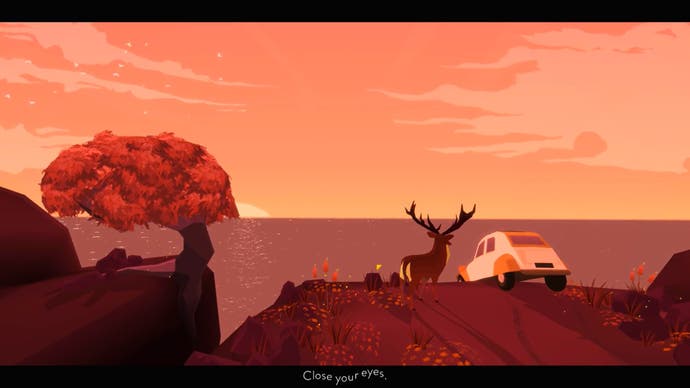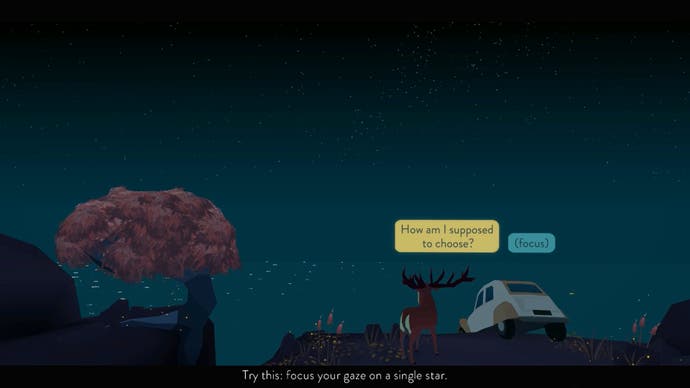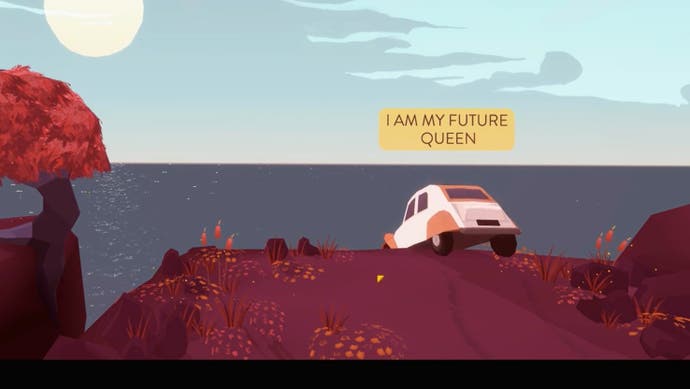Far From Noise and the value - and dangers - of loneliness
Cliff notes.
If you ever have to drive as much as I do, your mind begins to wander as your body enters autopilot. Somehow simultaneously, you consider each decision you make behind the wheel while thinking of everything else going on in your life. Sometimes you connect the two: will slowing down at this amber light make me late for my appointment? Will the car opposite avoid the cat at the edge of the pavement? And will I skid the car off the edge of the nearby cliff?
That final situation is where things begin in Far From Noise, a visual novel made up entirely from an interactive conversation. You play a nameless character, hanging from the very edge of mortality in a classic car, overlooking the sea.
It's immediately apparent that the tone of the game isn't anything close to what you'd expect. The cheerful conversation bubbles remove the need for voice acting and give you the choice of nervously uttering sarcastic remarks, or phrases revealing pure dread. What also struck me about the game's playful artwork is the heavy use of cyan and magenta at the beginning, a throwback to bipack colour photography that I've only seen replicated in Martin Scorsese's film The Aviator. It adds to the dreamlike question of whether or not we're actually in the position we find ourselves in.
This surreal quality is translated into the way speech options spring out from the car, but only after staggered pauses, as if we're continuously gathering our thoughts and considering the (very few) options available to us. Eventually, the game gives in to complete hallucination, as different animals appear, making way for a deer that talks, revealing why the game is presented with slight letterboxing. This delivery is part of the game's quiet confidence, something that would have become lost if the right tone wasn't hit prior to production.

We never learn much about our protagonist, where they were heading, if they're in love with anyone, if they're missing someone as they stare down towards death. We never learn their name. Instead, they talk with the deer about their surroundings, what the purpose of life is and the beauty of nature. It's something I later learn is the interest of the game's creator, George Batchelor.
"I really wanted to get stuck into more writing, especially a conversation. I wanted to play a game where the whole game is a conversation," he tells me over Skype, comparing Far From Noise to the shorter dialogue found in his previous game Hot Date, a dog-based speed dating sim.
Originally, the game was going to involve a second person, passing by and potentially helping the main character. But this idea was soon dropped. "I was reading a lot of transcendentalist philosophy, and from that I read Ralph Waldo Emerson and [Henry David] Thoreau. Their writing was always very beautiful and poetic about nature. I wanted to capture that in the game. The themes of nature weren't there from the start, but grew from what I was reading at the time."
Another theme that's (unsurprisingly) present is loneliness. The different ways the main character is able to express themselves helps convey some part of their personality, removing the superficial layers of what they merely like and dislike. That's surprising, given the very real possibility of death makes them reflect on what their life has actually been about, an even more sweat-inducing scenario when no loved one is around and no sentimental possession is in sight, just an endless pool of blue.

Being a writer is all about solitude, enjoying the quiet and using it to be productive. I know I might seem like Donna Tartt saying that, but sometimes any game can feel too busy. And yet Far From Noise appears to be one of the very few games to address isolation in a substantial way. This feeling's enhanced by the deer's ability to speak in profound and challenging statements, complemented by the soft musical score in the background. "It's very subtle and very quiet. I wanted it to be understated," Batchelor says, describing the work by Geoff Lentin.
Asked whether the game is meant to mirror this solitude, giving players a refreshing break from the world, or if it's about nature and life, Batchelor replies, "I think it's all of them at the same time and also none of them. If someone plays it and thinks it's about loneliness and that connects with them, or nature, then that's what it is for them."
The impact of Batchelor's reading is often present. "If you constantly surround yourself with others, your thoughts will become nothing but theirs," says the deer at one point. The influence of Emerson becomes unequivocal here, telling us to be self-reliant and independent. It's quite ironic for the character to be told this, given their state of dire need throughout the game. It also echoes our own self-absorbed world, best demonstrated by Emerson's 20th century successor Ayn Rand and her subsequent ideology of selfishness.
Perhaps that's where Far From Noise reveals itself as a parable, showing us that the moral is to enjoy the rich pleasures of life such as nature, but with loved ones with us at all times, avoiding the horrifying situation of a lonely death. All that's required is a smooth drive to the coast, the sound of waves gently bumping into each other as accompaniment, and seatbelts fastened tightly.

